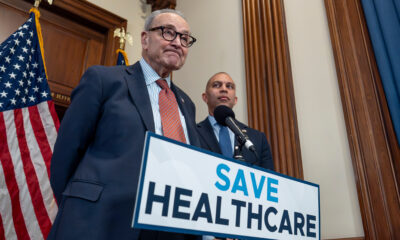Health
Congress Must Reform 340B Program to Support Low-Income Patients

The federal 340B program, designed to assist safety-net clinics and hospitals in providing care for low-income and uninsured patients, is facing significant scrutiny for its shortcomings. Originally established to stretch resources, the program has evolved into a complex system that often fails to deliver benefits to the very patients it aims to support.
According to the Congressional Budget Office (CBO), annual drug spending through the 340B program surged from $6.6 billion in 2010 to nearly $44 billion in 2021. This represents an average annual growth rate of approximately 19%, starkly contrasting with the 4% growth in overall brand-name drug spending during the same period. Despite this dramatic increase in funding, patients frequently do not experience corresponding reductions in their pharmacy bills or medical expenses.
Impact on Patients and Communities
The 340B program has inadvertently fostered a trend of hospital consolidation. Larger healthcare systems are acquiring smaller clinics and private practices to maximize their profits from the program. This consolidation has consequences: patients are often required to travel greater distances for care, and communities find themselves with fewer healthcare options.
Research indicates that hospitals participating in the 340B program frequently charge higher prices for both procedures and prescriptions. As a result, instead of receiving the financial relief intended by the program, many patients are facing increased costs and diminished access to necessary services.
Call for Reform in Congress
In light of these challenges, there is a growing consensus that reforming the 340B program is essential. The goal of such reforms would be to prioritize patient needs and ensure that the financial resources generated by the program effectively reach those who require assistance the most.
Notably, Senator Tammy Baldwin is among a bipartisan group actively working on reforms aimed at improving the situation for patients across Wisconsin. Her leadership in this effort is seen as a positive step towards addressing the shortcomings of the 340B program, and many constituents are hopeful that tangible changes will come from these discussions.
As the conversation surrounding the 340B program continues, it remains crucial for Congress to take decisive action. Reforming this program could help restore its original purpose of providing essential healthcare services to low-income populations, ensuring that the benefits of significant funding are felt where they are most needed.
-

 Science2 weeks ago
Science2 weeks agoNostradamus’ 2026 Predictions: Star Death and Dark Events Loom
-

 Technology1 month ago
Technology1 month agoOpenAI to Implement Age Verification for ChatGPT by December 2025
-

 Technology6 months ago
Technology6 months agoDiscover the Top 10 Calorie Counting Apps of 2025
-

 Health4 months ago
Health4 months agoBella Hadid Shares Health Update After Treatment for Lyme Disease
-

 Health4 months ago
Health4 months agoAnalysts Project Stronger Growth for Apple’s iPhone 17 Lineup
-

 Health4 months ago
Health4 months agoErin Bates Shares Recovery Update Following Sepsis Complications
-

 Technology4 months ago
Technology4 months agoElectric Moto Influencer Surronster Arrested in Tijuana
-

 Technology5 months ago
Technology5 months agoDiscover How to Reverse Image Search Using ChatGPT Effortlessly
-

 Technology6 months ago
Technology6 months agoMeta Initiates $60B AI Data Center Expansion, Starting in Ohio
-

 Technology6 months ago
Technology6 months agoRecovering a Suspended TikTok Account: A Step-by-Step Guide
-

 Technology2 months ago
Technology2 months agoDiscover 2025’s Top GPUs for Exceptional 4K Gaming Performance
-

 Health6 months ago
Health6 months agoTested: Rab Firewall Mountain Jacket Survives Harsh Conditions





















